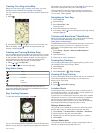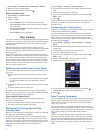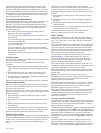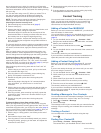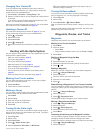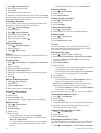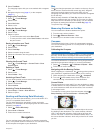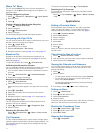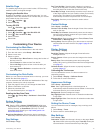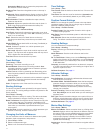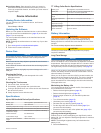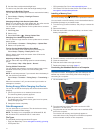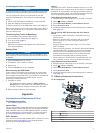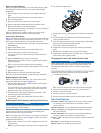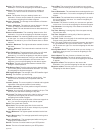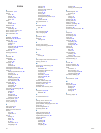
Satellite Page
The satellite page shows your current location, GPS accuracy,
satellite locations, and signal strength.
Changing the Satellite View
By default, the satellite view is with North at the top. You can
change the view of the satellites to be oriented with your current
track toward the top of the screen.
1
Select > Satellite > .
2
Select Track Up.
Turning Off GPS
Select > Satellite > > Use With GPS Off.
Simulating a Location
1
Select > Satellite > > Use With GPS Off.
2
Select > Set Location On Map.
3
Select a location.
4
Select Use.
Customizing Your Device
Customizing the Main Menu
You can move, add, and delete items in the main menu.
1
From the main menu, select Setup > Main Menu.
2
Select a menu item.
3
Select an option:
• Select Move Up or Move Down to change the location of
the item in the list.
• Select Remove to delete an item from the list.
• Select Add Page to place an item on the list after you
have removed it.
• Select > Restore Defaults to reset the order of all
items in the menu.
Customizing the Data Fields
Before you can customize the data fields on the map, you must
enable the data fields (page 13).
You can customize the data fields and dashboards of the map,
compass, elevation plot, and trip computer.
1
Open the page for which you will change the data fields.
2
Select a data field to customize.
3
Select the new data field.
For data field descriptions, see page 18.
Enabling the Map Data Fields
Select > > Setup Map > Dashboard > Small Data
Fields.
System Settings
Select Setup > System.
GPS: Sets the GPS to Normal, WAAS/EGNOS (Wide Area
Augmentation System/European Geostationary Navigation
Overlay Service), or Demo Mode (GPS off). For more
information about WAAS, go to http://www.garmin.com
/aboutGPS/waas.html.
BaseCamp BaseStation: Sets how the device connects to
BaseCamp when the device is connected to the computer.
Dog Settings
Select Setup > Dogs.
Dog Track On Map: Sets the length (duration in minutes or
hours) of the dog track on the map. Reducing the duration of
the track shown can reduce the clutter on the map.
Zoom Map To Dogs: Automatically zooms the map to show all
of the dogs' locations and your location unless you manually
pan the map. This feature is very helpful because it
automatically zooms the map to the level it is most helpful.
Dog Alerts: Sets how you are alerted to certain actions
(page 4).
Contact Settings
Select Setup > Contacts.
Contact Track On Map: Sets the length of time of the contact
track on the map.
Zoom Map To Contacts: Automatically zooms out the map to
show all of the contacts' locations and your location unless
you manually pan the map.
Message Alerts: Sets message alerts to Tone, Vibrate, Tone
and Vibrate, or Message Only.
Pairing Setup: Sets the options your device uses to track and
communicate with other devices. See page 9, page 9, and
page 16.
Display Settings
Select Setup > Display.
Backlight Timeout: Adjusts the length of time before the
backlight turns off.
Screen Capture: Allows you to save the image on the device
screen.
Battery Save: Saves the battery power and prolongs the
battery life by turning off the screen when the backlight times
out (page 16).
Calibrate Screen: Aligns the screen to properly respond to
touches (page 13).
Calibrating the Touchscreen
You can calibrate the screen, if it does not seem to be
responding properly.
1
Select Setup > Display > Calibrate Screen.
2
Follow the on-screen instructions.
Appearance Settings
Select Setup > Appearance.
Mode: Sets a light background, a dark background, or
automatically switches between the two based on the sunrise
and sunset time for your current location.
Background: Sets the background image.
Day Highlight Color: Sets the color for selections made when
in day mode.
Night Highlight Color: Sets the color for selections made when
in night mode.
Setting the Device Tones
You can customize tones for messages, keys, warnings, and
alarms.
1
Select Setup > Tones.
2
Select a tone for each audible type.
Map Settings
Select Setup > Map.
Orientation: Adjusts how the map is shown on the page. North
Up shows North at the top of the page. Track Up shows your
current direction of travel toward the top of the page.
Customizing Your Device 13



